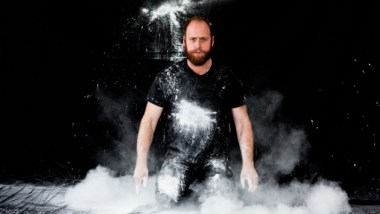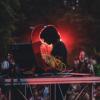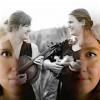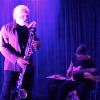
Cutting-edge genres meet. Conductor/composer Christopher Rountree and indie-rock musician Anna Bulbrook programmed their new concert series, SILENCE, with the idea to mix experimental contemporary classical with experimental pop and indie. In a mid-concert chat, the two explained that they were hoping to create a concert experience that would inspire greater openness and allow for wider listening across genre lines and within the natural soundscape of Descanso Gardens.
Rountree and Bulbrook have hit on a really good idea in bridging these two scenes. There is a lot in common, especially in the vocal and electronic music being written now by “now” people.

One exception was the night’s opening music. Gloria Cheng’s performance of selections from Cage’s Sonatas and Interludes (1948) for prepared piano was gorgeous, subtly amplified to fill the roof of the Rose Pavilion. Early Cage is wonderful, but Cage is not a “now” person. Programming him did not make a lot of sense, especially considering the wealth of experimental music being made in Los Angeles currently. It almost felt like the Cage was on a different concert.
The standout set of the night was by Brooklyn-based songwriter and sound artist L’Rain. Working with band member keyboardist/saxophonist Ben Katz, the two formed a continuous set of song and processed-sound improvisation. While most successful in the context of the song forms, their manipulation of each other’s live samples heightened the complexity of each section.

Waviness permeated. From the nostalgic pitch wavering of her guitar (whiff of Revolver), to the Messiaen-ish organ in her final song, the sound always felt fluid — ripples continued beyond boundaries of sections and songs. At a favorite moment, Katz played a high synth line that followed L’Rain’s chestnut vocals like a sparrow, ten meters above.
Things shook apart after intermission. Lisa E. Harris, composer/singer/performance artist, was brought into this program to perform her own work and to lead the audience in Pauline Oliveros’s “deep listening” practice. Harris always seemed pressed for time. Watching someone attempting to introduce deep listening while also having to ask how much time she has is awful.
It was an oversight not to open the concert with a more thought-out workshop in deep listening. Rountree and Bulbrook should have understood the nature of Oliveros’s work, how it is about life practice and self-reflection, and how odd it would be to throw that in between acts. They could have programmed one of Oliveros’s more concert-oriented works; there have been enough “productions” of Tuning Meditation and Deep Listening since her death in 2016. For a series that is hoping to incorporate a large variety of musical experiences, figuring out the best way to present the work is very important.

Julia Holter ended the night with her and her keyboard and labyrinth of effects pedals. Holter’s convoluted, lonely-wolf songs seem potentially super cool, but the balance between the keyboard and her vocals was really off. I could tell that there was a better way I could be hearing these songs, but the whole time she was unsupported by the sound and the too-quiet audience. Her comment, meant probably to compliment the “listening” intent of the evening, said it all: “This is the quietest audience I’ve ever had.”
Not enough was done in the programming and the setup to inspire the kind of equal access to music that Rountree and Bulbrook described. There were no programs, in an effort to let the audience hear without preconceptions. The standard new-music concert setup, regardless of whether it’s inside or outside or if there are or aren’t programs, is not going to be the optimal way to hear this range of music.




